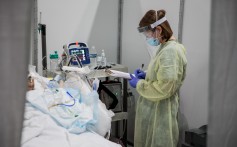White House accuses US broadcaster Voice of America of promoting ‘Beijing’s propaganda’
The attack on a government-funded news outlet came as some lawmakers have intensified their criticism of how the Chinese government handled the outbreak
Owen Churchill in Washington, DC and Robert Delaney Published:11 Apr, 2020
The White House has lashed out at broadcaster Voice of America (VOA), accusing the broadcaster of amplifying “Beijing’s propaganda” by quoting China’s official coronavirus statistics in its reporting and publishing footage of celebrations marking the end of Wuhan’s lockdown
The extraordinary attack on a government-funded news outlet came as the Trump administration and some lawmakers have intensified their criticism of how the Chinese government handled the outbreak.
“VOA too often speaks for America’s adversaries – not its citizens,” said the White House in a Thursday missive, adding that the outlet, which is funded through congressional appropriations, was “promoting propaganda” with taxpayers’ money.
“This week, VOA called China’s Wuhan lockdown a successful ‘model’ copied by much of the world – and then tweeted out video of the Communist government’s celebratory light show marking the quarantine’s alleged end,” the release said.
Western and Asian habits still differ, but the coronavirus pandemic is normalising mask-wearing
The story that the White House appeared to be referencing was an Associated Press article that the VOA had syndicated on Tuesday, not a staff-written story.
“Even worse, while much of the US media takes its lead from China, VOA went one step further,” the White House’s Thursday missive continued. “It created graphics with Communist government statistics to compare China’s Coronavirus death toll to America’s.”
The White House did not reference the fact that many other prominent news outlets, including the The Washington Post, Reuters and Associated Press, also published stories covering the moment when US deaths surpassed China’s official figures at the end of March.
Coronavirus latest: global death toll passes 100,000
11 Apr 2020

In a statement released Friday defending its objectivity, VOA director Amanda Bennett noted that data from the graphic cited by the White House was taken from statistics gathered by Johns Hopkins University, which she said was “used throughout the world”
“We are thoroughly covering China’s disinformation and misinformation in English and Mandarin and at the same time reporting factually – as we always do in all 47 of our broadcast languages – on other events in China,” Bennett said, before listing more than a dozen reports they published recently that were sceptical of China’s claims throughout its Covid-19 epidemic.
In an internal memo seen by the South China Morning Post, Bennett said suggestions the VOA was publishing propaganda was a discredit to “the hundreds of VOA men and women around the world who work hard – sometimes risking or even losing their lives – to give fact-based, fair, unbiased news and information to the world.”
In 2013, a reporter for VOA’s Somali service was killed in a bomb blast in Mogadishu, Somalia.
“Those of you – and it is most of you – who work in highly polarised climates know what it is like to have a person, an organisation or a group pull out one quote, one story, or one photo that they don’t like (or that doesn’t support their cause) from a huge body of work and use it to claim ‘bias,’” Bennett continued. “So all of this should feel familiar to you.”
The VOA was one of five US outlets targeted recently by Beijing with new media restrictions requiring the organisations to submit detailed information about their operations to authorities.
“Please remember that the wonderful thing about being government-funded independent media – rather than state-controlled media – is that we are protected by law in order to continue doing just the kind of incredibly important fact-based work that you do every day,” Bennett said in the memo.
The White House’s criticism of VOA was more about deflecting criticism of its own handling of the coronavirus outbreak and less about concerns over objectivity in the media, said Jorge Guajardo, a former Mexican ambassador to China.
“It has nothing to do with press freedoms, information or objectivity, anything other than political hackery,” said Guajardo, now a senior director at McLarty Associates.
Trump threatens to cut US funding of World Health Organisation amid coronavirus pandemic
Noting that VOA’s founding principles of providing objective news coverage to an international audience, including those living in authoritarian countries, Guajardo said that objectivity and truth “doesn’t necessarily mean a US version of everything, or opposing a foreign version.”
“In this case, I did not see an accusation of the Voice of America for distorting truth, or not being objective,” he continued. “It’s just an accusation because they are reporting something that’s favorable to a country the White House sees as an adversary.”
VOA was not the first organisation accused by the Trump administration this week of doing Beijing’s bidding.
Having lashed out repeatedly at the World Health Organisation (WHO) over recent days, Trump said on Friday his administration would be considering moves against the UN agency next week over its alleged deference to Beijing in how it handled the emergence of the coronavirus.
“We’re paying [the WHO] 10 times more than China, and they are very, very China-centric,” Trump said at a White House coronavirus task force press briefing, misstating the discrepancy between the two countries’ contributions.
The White House’s proposed budget for 2021 cuts the US contribution to the organisation significantly, from US$122 million to under US$58 million. China’s net payable contribution to the agency for 2020 was US$57 million, according to WHO documentation.
“China always seems the best to get the better of the argument and I don’t like that,” Trump said. “We’re gonna be talking about that next week in great detail. We’re going to be looking at it very, very closely.”
Trump’s railing against the WHO came as a group of senators wrote to China’s US ambassador demanding the country’s government close all wet markets over concerns about the sites exposing humans to zoonotic diseases such as Covid-19.
In a Thursday letter to Cui Tiankai led by South Carolina’s Lindsey Graham, a Republican, and Delaware’s Chris Coons, a Democrat, the senators cited recent comments by top health official Anthony Fauci, who said last week that the global community should pressure countries where wet markets exist to close them down.
“It boggles my mind how, when we have so many diseases that emanate out of that unusual human animal interface that we don’t just shut it down,” Fauci, who is director of the National Institute of Allergy and Infectious Diseases, said on Fox News.
“We understand and respect that wet markets are an important component to Chinese society and way of life, but we believe the current moment, which has disrupted everyday life around the world, calls for extreme precautions,” the lawmakers wrote.
Nine other senators, including Chris Van Hollen, a Maryland Democrat, and Mitt Romney, a Republican representing Utah also signed the letter.
Additional reporting by Mark Magnier.

Owen Churchill joined the Post in 2018 after several years working as a reporter and editor in China. He covers US-China relations, human rights, and China's influence overseas. A co-founder of the Shanghai-based news outlet Sixth Tone, he is an alumnus of SOAS in London and Fudan University in Shanghai.

Robert Delaney is the Post’s North America bureau chief. He spent 11 years in China as a language student and correspondent for Dow Jones Newswires and Bloomberg, and continued covering the country as a correspondent and an academic after leaving. His debut novel, The Wounded Muse, draws on actual events that played out in Beijing while he lived there.
Nine other senators, including Chris Van Hollen, a Maryland Democrat, and Mitt Romney, a Republican representing Utah also signed the letter.
Additional reporting by Mark Magnier.

Owen Churchill joined the Post in 2018 after several years working as a reporter and editor in China. He covers US-China relations, human rights, and China's influence overseas. A co-founder of the Shanghai-based news outlet Sixth Tone, he is an alumnus of SOAS in London and Fudan University in Shanghai.

Robert Delaney is the Post’s North America bureau chief. He spent 11 years in China as a language student and correspondent for Dow Jones Newswires and Bloomberg, and continued covering the country as a correspondent and an academic after leaving. His debut novel, The Wounded Muse, draws on actual events that played out in Beijing while he lived there.
No comments:
Post a Comment